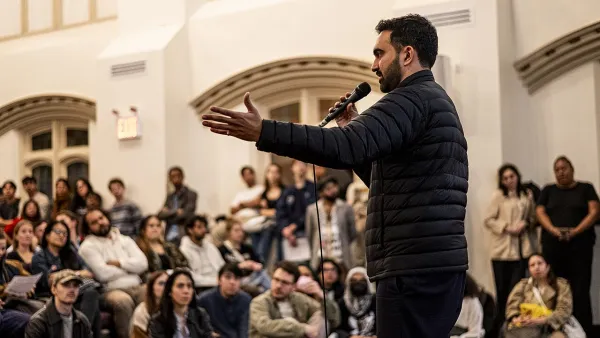David Giles explains the economic extremes that now characterize New York City and offers four suggestions on how to retain and strengthen its middle class.
"Looking at New York's recent history, an outsider might be forgiven for thinking the city doesn't really want a middle class or else somehow assumes that they're an inexhaustible or fungible resource, as Bloomberg's comment on the report's release date, Feb. 5, seemed to suggest. But here is a question for the mayor, and others who share his nonchalance: The feeling that "they come and they go" may be true at the moment – but what happens when middle class residents don't even want to stay anymore? Will there be others to replace them?
In case the path toward a permanent exodus is not one New York wants to travel, here are some suggestions, per the report (see p. 48), for strengthening the city's middle class:
• Start making some big investments in the city's six community colleges. Community colleges are a gateway to the middle class for increasing numbers of city residents. Enrollment has increased by 22 percent over the past 10 years while total funding, adjusted for inflation, has increased by just five percent during that same period.
• Develop a comprehensive strategy to diversify the economy and support the growth of middle-income jobs. If there's anything the present financial crisis has taught us, it's that Wall Street cannot be depended on to sustain a great city like New York. We should be nurturing the city's entrepreneurs, artisans, freelancers and small manufacturers."
FULL STORY: MIDDLE CLASS BLUES IN A CITY OF EXTREMES

Maui's Vacation Rental Debate Turns Ugly
Verbal attacks, misinformation campaigns and fistfights plague a high-stakes debate to convert thousands of vacation rentals into long-term housing.

Planetizen Federal Action Tracker
A weekly monitor of how Trump’s orders and actions are impacting planners and planning in America.

In Urban Planning, AI Prompting Could be the New Design Thinking
Creativity has long been key to great urban design. What if we see AI as our new creative partner?

King County Supportive Housing Program Offers Hope for Unhoused Residents
The county is taking a ‘Housing First’ approach that prioritizes getting people into housing, then offering wraparound supportive services.

Researchers Use AI to Get Clearer Picture of US Housing
Analysts are using artificial intelligence to supercharge their research by allowing them to comb through data faster. Though these AI tools can be error prone, they save time and housing researchers are optimistic about the future.

Making Shared Micromobility More Inclusive
Cities and shared mobility system operators can do more to include people with disabilities in planning and operations, per a new report.
Urban Design for Planners 1: Software Tools
This six-course series explores essential urban design concepts using open source software and equips planners with the tools they need to participate fully in the urban design process.
Planning for Universal Design
Learn the tools for implementing Universal Design in planning regulations.
planning NEXT
Appalachian Highlands Housing Partners
Mpact (founded as Rail~Volution)
City of Camden Redevelopment Agency
City of Astoria
City of Portland
City of Laramie





























